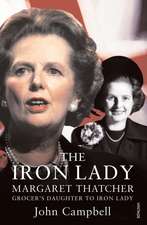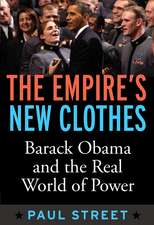Military Engagement: Influencing Armed Forces Worldwide to Support Democratic Transitions
Autor Dennis C. Blairen Limba Engleză Paperback – 27 mar 2013
The response of an autocratic nation's armed forces is crucial to the outcome of democratization movements throughout the world. But how can military officers and defense officials in democratic nations persuade their counterparts in autocratic regimes to favor democratic transitions? Here, Admiral Dennis Blair confronts this hard-edged challenge with a primer on the factors that affect military behavior during democratic transitions.
Military Engagement makes the strong case for why the armed forces of any country should favor democracy and why, contrary to conventional wisdom, many military leaders have supported democratic transitions in different regions of the world. Further, it explains why military support, active or tacit, is essential to the success of any demo cratic transition. Blair provides incisive commentary on civil-military relations and outlines the foundational elements of armed forces in a democratic country. He presents sound advice to defense officials and military leaders in established democracies that can be put into practice when interacting with colleagues in both autocratic regimes and those that have made the break with dictatorship.
This succinct handbook analyzes democratic transitions in five major regions and surveys the internal power dynamics in countries such as Iran and North Korea, dictatorships that are hostile toward and fearful of democratic influences. Blair juxtaposes the roles, values, and objectives of military leaders in autocratic nations with those in democracies. In turn, Military Engagement highlights how crossnetworking with international military delegations can put external pressure on autocratic countries and persuade them that democracies are best not only for the country itself, but also for the armed forces. Volume one of this two-volume project provides the educational foundation necessary so that military officers from established democracies can raise their game in achieving effective dialogue on democratic development.
Military Engagement makes the strong case for why the armed forces of any country should favor democracy and why, contrary to conventional wisdom, many military leaders have supported democratic transitions in different regions of the world. Further, it explains why military support, active or tacit, is essential to the success of any demo cratic transition. Blair provides incisive commentary on civil-military relations and outlines the foundational elements of armed forces in a democratic country. He presents sound advice to defense officials and military leaders in established democracies that can be put into practice when interacting with colleagues in both autocratic regimes and those that have made the break with dictatorship.
This succinct handbook analyzes democratic transitions in five major regions and surveys the internal power dynamics in countries such as Iran and North Korea, dictatorships that are hostile toward and fearful of democratic influences. Blair juxtaposes the roles, values, and objectives of military leaders in autocratic nations with those in democracies. In turn, Military Engagement highlights how crossnetworking with international military delegations can put external pressure on autocratic countries and persuade them that democracies are best not only for the country itself, but also for the armed forces. Volume one of this two-volume project provides the educational foundation necessary so that military officers from established democracies can raise their game in achieving effective dialogue on democratic development.
| Toate formatele și edițiile | Preț | Express |
|---|---|---|
| Paperback (3) | 212.89 lei 6-8 săpt. | |
| Brookings Institution Press – 27 mar 2013 | 212.89 lei 6-8 săpt. | |
| Brookings Institution Press – 14 iun 2013 | 362.62 lei 6-8 săpt. | |
| Brookings Institution Press – 19 iun 2013 | 486.81 lei 6-8 săpt. |
Preț: 212.89 lei
Nou
Puncte Express: 319
Preț estimativ în valută:
40.74€ • 43.56$ • 33.97£
40.74€ • 43.56$ • 33.97£
Carte tipărită la comandă
Livrare economică 17 aprilie-01 mai
Preluare comenzi: 021 569.72.76
Specificații
ISBN-13: 9780815725053
ISBN-10: 0815725051
Pagini: 144
Ilustrații: illustrations (black and white), maps (black and white)
Dimensiuni: 191 x 235 x 11 mm
Greutate: 0.32 kg
Editura: Brookings Institution Press
Colecția Brookings Institution Press
ISBN-10: 0815725051
Pagini: 144
Ilustrații: illustrations (black and white), maps (black and white)
Dimensiuni: 191 x 235 x 11 mm
Greutate: 0.32 kg
Editura: Brookings Institution Press
Colecția Brookings Institution Press
Notă biografică
Dennis Blair served as the U.S. director of national intelligence 2009–2010. A Rhodes Scholar, Blair spent a career in the U.S. Navy, retiring in 2002 as the commander in chief, U.S. Pacific Command.
Descriere
The response of an autocratic nation's armed forces is crucial to the outcome of democratization movements throughout the world. But how can military officers and defense officials in democratic nations persuade their counterparts in autocratic regimes to favor democratic transitions? Here, Admiral Dennis Blair confronts this hard-edged challenge with a primer on the factors that affect military behavior during democratic transitions.
Military Engagement makes the strong case for why the armed forces of any country should favor democracy and why, contrary to conventional wisdom, many military leaders have supported democratic transitions in different regions of the world. Further, it explains why military support, active or tacit, is essential to the success of any demo cratic transition. Blair provides incisive commentary on civil-military relations and outlines the foundational elements of armed forces in a democratic country. He presents sound advice to defense officials and military leaders in established democracies that can be put into practice when interacting with colleagues in both autocratic regimes and those that have made the break with dictatorship.
This succinct handbook analyzes democratic transitions in five major regions and surveys the internal power dynamics in countries such as Iran and North Korea, dictatorships that are hostile toward and fearful of democratic influences. Blair juxtaposes the roles, values, and objectives of military leaders in autocratic nations with those in democracies. In turn, Military Engagement highlights how crossnetworking with international military delegations can put external pressure on autocratic countries and persuade them that democracies are best not only for the country itself, but also for the armed forces. Volume one of this two-volume project provides the educational foundation necessary so that military officers from established democracies can raise their game in achiev
Military Engagement makes the strong case for why the armed forces of any country should favor democracy and why, contrary to conventional wisdom, many military leaders have supported democratic transitions in different regions of the world. Further, it explains why military support, active or tacit, is essential to the success of any demo cratic transition. Blair provides incisive commentary on civil-military relations and outlines the foundational elements of armed forces in a democratic country. He presents sound advice to defense officials and military leaders in established democracies that can be put into practice when interacting with colleagues in both autocratic regimes and those that have made the break with dictatorship.
This succinct handbook analyzes democratic transitions in five major regions and surveys the internal power dynamics in countries such as Iran and North Korea, dictatorships that are hostile toward and fearful of democratic influences. Blair juxtaposes the roles, values, and objectives of military leaders in autocratic nations with those in democracies. In turn, Military Engagement highlights how crossnetworking with international military delegations can put external pressure on autocratic countries and persuade them that democracies are best not only for the country itself, but also for the armed forces. Volume one of this two-volume project provides the educational foundation necessary so that military officers from established democracies can raise their game in achiev










